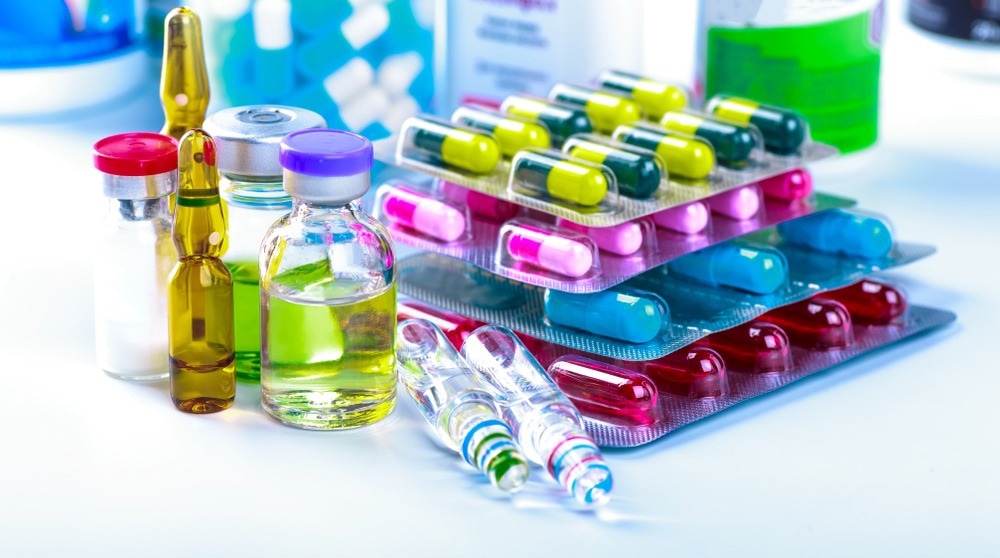Biologics are a type of drug or vaccine that is made from a living organism. These drugs can consist of a variety of substances such as proteins, sugars, DNA, or cells and can be derived from humans, animals, or even microorganisms, including bacteria or viruses.

Image Credit: Bukhta Yurii/Shutterstock.com
This novel drug type aims to aid conditions and diseases, providing patients with a better quality of life. With various biologics working in different ways, this category of drugs may span a wider range of patient benefits.
Biologic drugs can include monoclonal antibodies, cytokines, growth factors, enzymes, and immunomodulators, which all aim to impact the immune response in various ways. These substances can make up biological products and may be produced through biotechnology methods.
Advantages of Biologics
Biomedical research has spearheaded progression in this area of science, with gene-based and cellular biologics being an advanced class of biologics developed to treat medical conditions and diseases that do not yet have a cure.
The potential of biologics can be seen through new disease targets being identified in diseases and disorders such as anemia, growth deficiency, cystic fibrosis, diabetes, and even cancer.
Additionally, this type of drug's ability to predict individuals' predisposition to genetic diseases may be revolutionary for the advancement of science, as this can include diseases such as Parkinson's disease. Understanding and predicting the propensity of genetic disease can ensure appropriate care, and medication is provided to patients to aid in disease management before onset.
Biologic drugs may expand the field of personalized medicine with the ability of these drugs to potentially treat heterogeneous genetic disorders.
Biologics Versus Conventional Drugs
Biologics can differ from conventional drugs in many ways, with biologic drugs activating particular proteins to create certain immune responses to targets, while conventional drugs work systemically to activate the whole immune system.
Biologic molecules tend to be much larger than chemical drugs, consisting of a limited number of atoms. Additionally, biologic molecules have a higher number of atoms, which can be in the thousands, making this class of drugs more complex.
Diseases such as rheumatoid arthritis, a type of chronic inflammatory autoimmune disease, currently have no cure, and with approximately more than 1.3 million sufferers, this can cause a significant burden on healthcare systems.
Many traditional pharmacological strategies utilize various treatments such as non-steroidal anti-inflammatory drugs, analgesics, glucocorticoids, as well as disease-modifying anti-rheumatic drugs. These drugs work differently; conventional approaches may combine these to treat various diseases.
Poor disease treatment or management of rheumatoid arthritis can result in permanent joint damage as well as deformity, and with only a 2-year disease onset that leads to disability in 20% of populations, effective treatment options are critical.
The use of biologics for treating rheumatoid arthritis has provided a revolutionary change over the past ten years, with novel biologic products that aim to directly target the inflammatory cascade of the disease.
The first biologic-targeted treatment for rheumatoid arthritis was approved by the Food and Drug Administration (FDA) in 1998, which consisted of a tumor necrosis factor (TNF) antagonist named etanercept. This was the start of a cascade of approvals from the FDA, including other TNF antagonists, an interleukin-1 inhibitor, a T-cell co-stimulation blocker, as well as a B-cell depleting agent.
Biologics 101
Challenges of Biologics
The complexity of biologic drugs can lead to the following challenges, such as having a more unpredictable response time, with this varying in different people, as well as the response changing over time, requiring a change of medication for the patient.
Other challenges can include being more difficult to create and subsequently being more expensive to produce. It is possible that one year of treatment with biologic drugs can cost over $100,000.
These drugs are also usually administered by injection or intravenously, so patients may require close monitoring as a reaction or adverse effect at the site of administration is possible.
Additionally, biologic drugs can be at a higher risk of contamination as they are made from living organisms, and subsequently, they usually require refrigeration as a preventative measure.
Future Outlook
With biologic products being researched for a higher level of targeting diseases and disorders with no current cure, the path towards personalized medicine has become inevitable.
The potential of these drugs may be revolutionary for patients suffering from genetic disorders or diseases with fast onset, as biologic strategies may be able to target cell signaling pathways in a variety of diseases, aiding in effective disease management.
The subsequent effect of this is the prioritization of patient care and the quality of treatment being provided to patients that would otherwise be burdened with a poor quality of life. Biologic products may be more expensive; however, by alleviating the socio-economic burden on healthcare systems, this route may be more cost-effective as a whole.
Sources:
- Curtis J, Singh J. Use of Biologics in Rheumatoid Arthritis: Current and Emerging Paradigms of Care. Clin Ther. 2011;33(6):679-707. doi:10.1016/j.clinthera.2011.05.044
- Morrow T, Felcone LH. Defining the difference: What Makes Biologics Unique. Biotechnol Healthc. 2004 Sep;1(4):24-9. PMID: 23393437; PMCID: PMC3564302.
- Skerrett P. The FDA just broke the logjam on interchangeable biologics. Here's what that decision means. STAT. https://www.statnews.com/2021/07/29/fda-first-interchangeable-biologic-insulin-decision-meaning/#:~:text=T%20he%20Food%20and%20Drug%20Administration%E2%80%99s%20decision%20on,in%20practice%2C%20however%2C%20depends%20on%20where%20you%20sit. Published 2022. Accessed October 17, 2022.
- What Are "Biologics" Questions and Answers. U.S. Food and Drug Administration. https://www.fda.gov/about-fda/center-biologics-evaluation-and-research-cber/what-are-biologics-questions-and-answers. Published 2022. Accessed October 17, 2022.
Further Reading
Last Updated: Dec 16, 2022